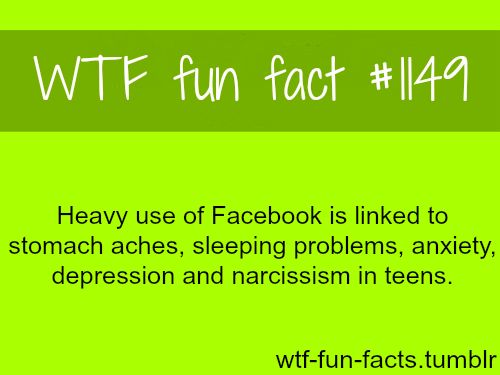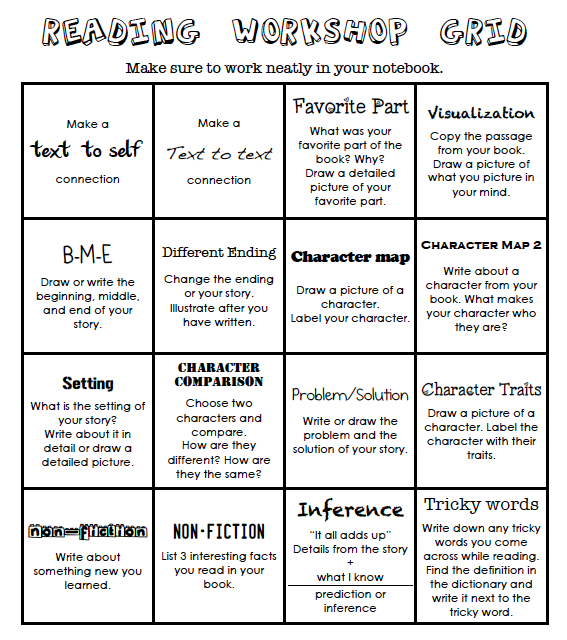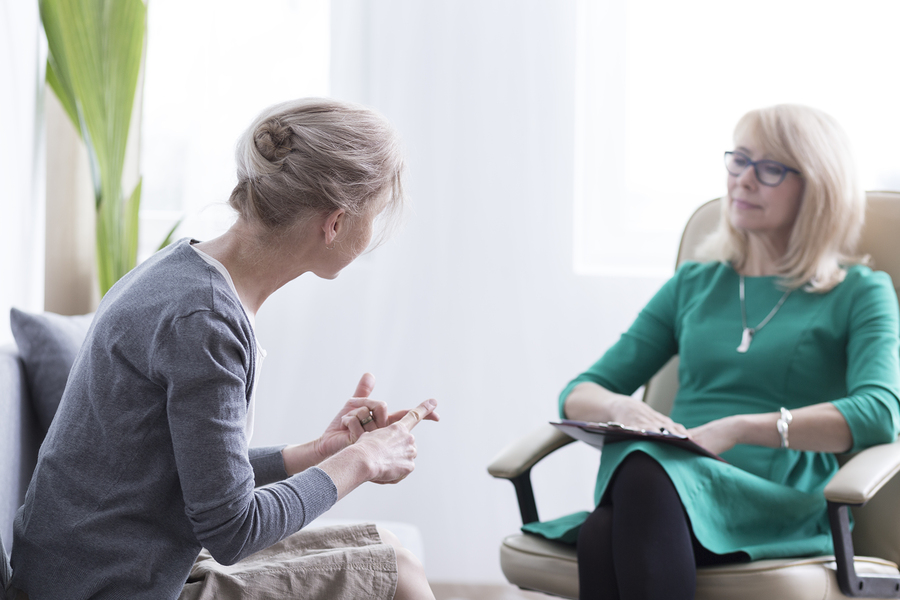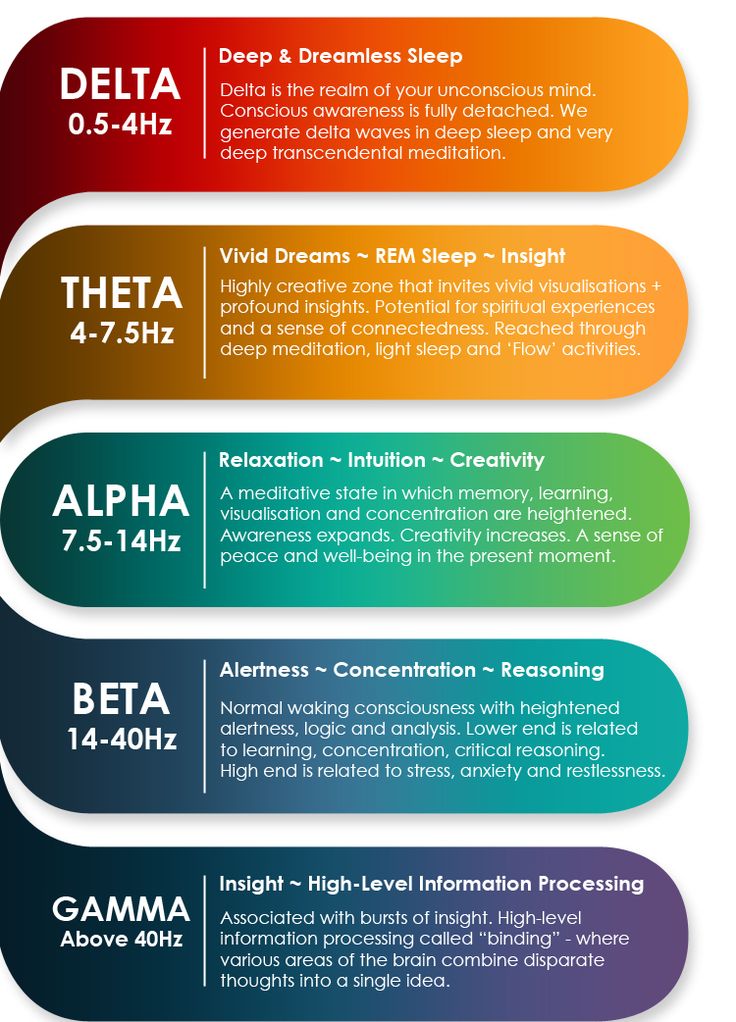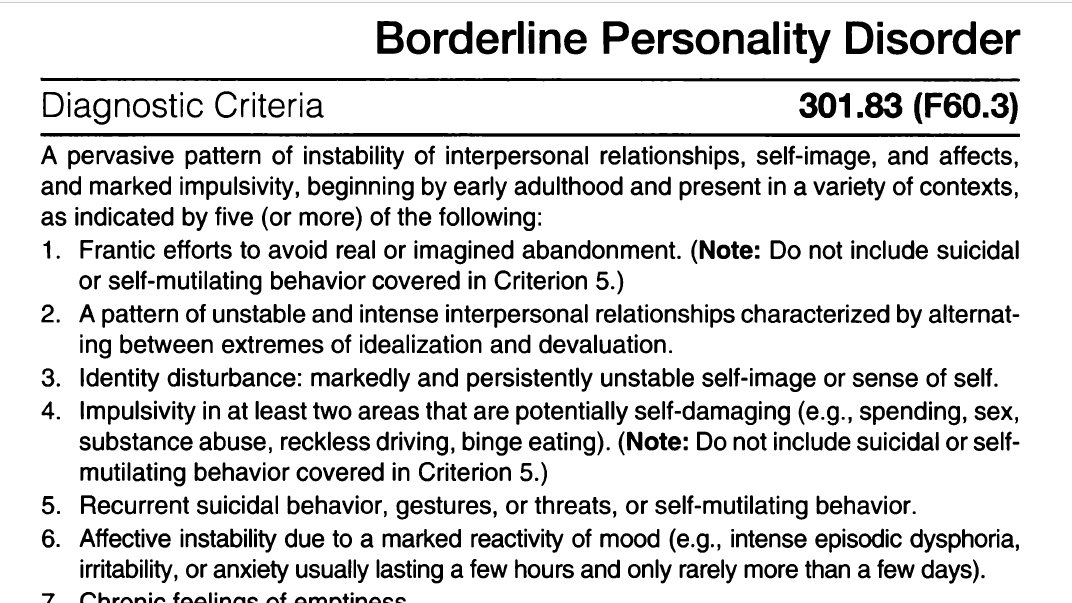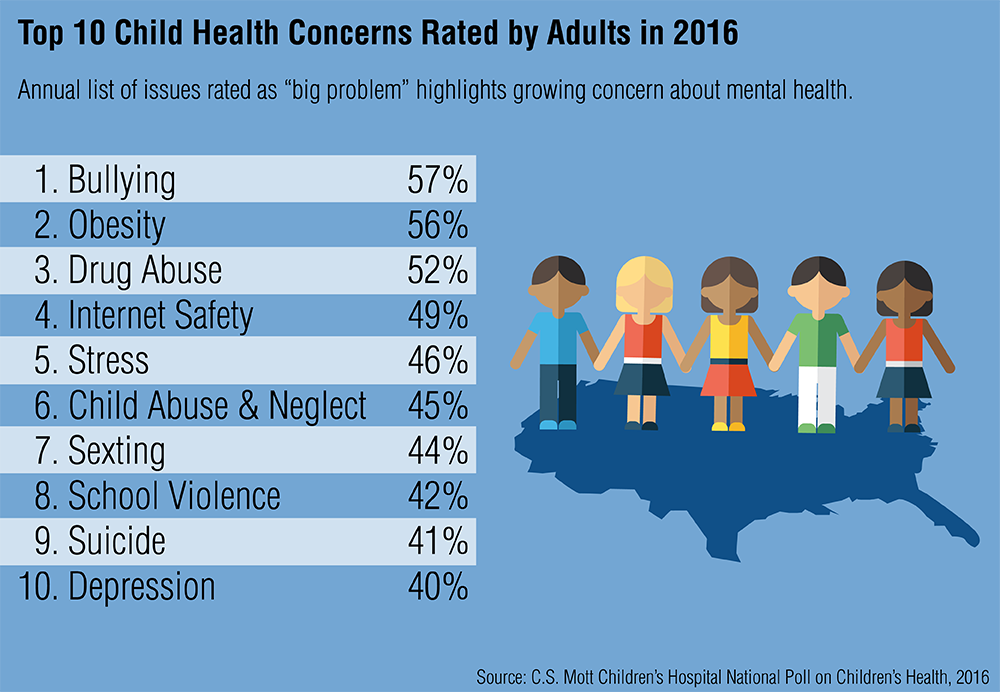Anxiety fun facts
10 Surprising Facts About Anxiety
According to the Anxiety and Depression Association of America (ADAA), anxiety disorders are the most common mental health conditions affecting 40 million Americans. However, anxiety is currently a popular buzzword with many people misunderstanding many facts about anxiety.
Feeling overwhelmed, struggling with racing thoughts and difficulty concentrating are some obvious ways people experience anxiety. Panic and fear are also common culprits associated with anxiety. But did you know anxiety can be a good thing? Did you know anxiety (like many difficult emotions) can be an opportunity for growth?
One of the surprising facts about anxiety for many is that it is a good thing – if you understand how to react to it.
1. Anxiety can be geneticWhy do some survive traumatic events and come through seemingly unscathed? And yet others develop anxiety disorders like PTSD, Panic Disorder, and Generalized Anxiety Disorder. One thing is certain: anxiety disorders and anxious temperaments seem to run in families. Studies also show that individuals who are genetically predisposed to anxiety are at a higher risk of developing anxiety after exposure to traumatic or stressful events.
Anxiety is often a cause or a trigger of depression. Research indicates women who have generalized anxiety disorder are at an increased risk for developing depression. People with chronic depression often develop symptoms of anxiety as a result of the mental exhaustion of depression. The same is true for sufferers of chronic anxiety. For example, people who struggle with Social Anxiety Disorder often develop depressive symptoms as a result of lifestyle choices made in order to accommodate the symptoms of Social Anxiety Disorder, such as avoiding others and public places.
3. Anxiety often begins in childhoodAnother one of the surprising facts about anxiety is that it usually begins in childhood.
According to the CDC, approximately 7% of children between the ages of 3 and 17 years old have diagnosed anxiety. Since children are still developing their verbal skills they can’t say, “I have anxiety” or “I’m really worried.”
Instead their anxiety shows up in complaints such as stomach aches, headaches, or behavioral issues like temper tantrums. Other common anxiety symptoms in children include restlessness, inattention, avoidance, and frequent meltdowns. Sadly, these symptoms often get misdiagnosed as ADHD – and then medicated.
4. Anxiety can cause physical symptomsMost people know that anxiety causes difficulty focusing and concentrating, restlessness, irritability and frustration. However, few people realize that anxiety causes serious physical problems like weakness, shortness of breath, rapid heart rate, nausea, hot flashes, and dizziness. People experiencing a panic attack often end up in the ER believing they are having a heart attack.
According to research at Harvard, anxiety has been indicated in several chronic physical illnesses, including heart disease, chronic respiratory disorders like COPD, gastrointestinal conditions such as IBS, and substance abuse. There is still a lot to learn about the way our body experiences anxiety and how it effects our physical health. However, what is certain is that long-term exposure to increased cortisol levels (i.e., anxiety) leads to decreased immunity and damage to the heart and lungs.
6. Anxiety can cause cold hands and feetHave you ever wondered why your hands and feel sometimes feel cold to the touch? Did you know that it could be the result of anxiety? When we feel anxious, the flight or fight response kicks in. When this occurs, blood flow is redirected from your extremities, such as your hands and feet, and towards the torso and vital organs. This creates the feeling of cold in your hands and feet.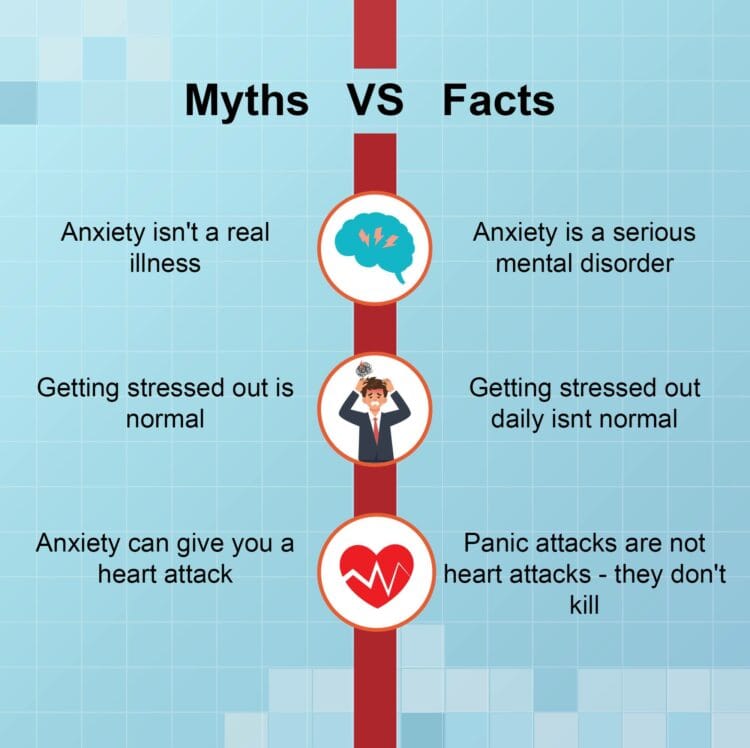
One of the surprising facts about anxiety is that, if left unchecked, it can lead to anger.
A common, but lesser-known side effect of anxiety is anger. When we feel powerless over a situation, or our life is out of our control, expressing anger is a natural way to feel a sense of control.
It’s much easier to externalize the conflict rather than acknowledge the real issue and deal with it. Additionally, with chronic sufferers of anxiety, depression sometimes develops.
8. Anxiety can cause memory problemsBecause individuals who suffer from anxiety often struggle to stay in the present moment, it makes them often forgetful. People who suffer from generalized anxiety disorder struggle with worry and an inability to control the worry. When we worry, it’s often about something that hasn’t happened yet, meaning we are in thinking in the future – where problems may occur. This is why people who suffer from anxiety often appear like they’re distracted, not listening, or they just don’t care.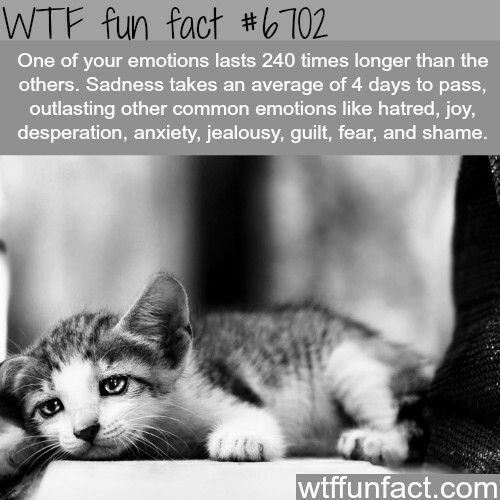
Perhaps one of the most surprising facts about anxiety is that women are twice as likely as men to develop an anxiety disorder.
According to the ADAA, from the time a girl reaches puberty to the age of 50, she is twice as more likely to develop an anxiety disorder as a man. A woman’s fight or flight response is more easily activated and stays activated longer than a man’s – partly due to progesterone and estrogen. There’s also evidence to suggest that the female brain does not process serotonin as quickly as the male brain and they are more sensitive to low levels of corticotropin-releasing factor (CRF), a hormone that organizes stress responses in mammals.
10. Exercise can help reduce anxietyCountless studies show exercise helps decrease symptoms of anxiety. Did you know that a single workout has been proven to be a quick mood booster? And it doesn’t matter if the exercise is intense. It can be a quick walk around the block or a 30 minute run.
It can be a quick walk around the block or a 30 minute run.
Anxiety can also be a good thing. It can keep you safe. Walking to your car alone late at night? Anxiety can help alert you of your surroundings to get you to your car safely. Anxiety can help you perform better. Have a big presentation at work? Anxiety can help ensure you prepare so you perform your best.
Anxiety is also a normal and appropriate response to stressful events. It only becomes a problem when we react to it in a way that is counterproductive to a rich, full and meaningful life.
James Killian, LPC is the Principal Therapist & Owner of Arcadian Counseling in New Haven, CT where they specialize in helping over-thinkers, high achievers, and perfectionists take control and move From Surviving to Thriving.
Anxiety - 10 Interesting Facts You Might Not Know
by Karen Young
101,414
VIEWSOn average, one in four people will experience anxiety at some time in their lives. If you’ve ever experienced anxiety, you’ll be too familiar with its whip-cracking chase that seems to come from nowhere. Here are some facts about anxiety that will hopefully help to make more sense of your experience.
If you’ve ever experienced anxiety, you’ll be too familiar with its whip-cracking chase that seems to come from nowhere. Here are some facts about anxiety that will hopefully help to make more sense of your experience.
-
Anxiety has a genetic basis.
If either or both of your parents suffer from anxiety, there’s a high chance you’ll experience it as well. It’s about here the nature/nurture argument steps in. Anxiety can be passed down through genes (nature) or through parental behaviour (nurture). In a 2014 study, the α-endomannosidase gene was found to be associated with panic disorder and social anxiety disorder. On the nurture front, research has shown that anxious parents are more likely to inadvertently feed anxiety by being slower to grant autonomy or by supporting the avoidance of situations that might cause anxiety. (These behaviours are completely understandable and driven by the most loving intentions but for kids with anxiety the short-term easing of anxiety can make anxiety worse in the long run.
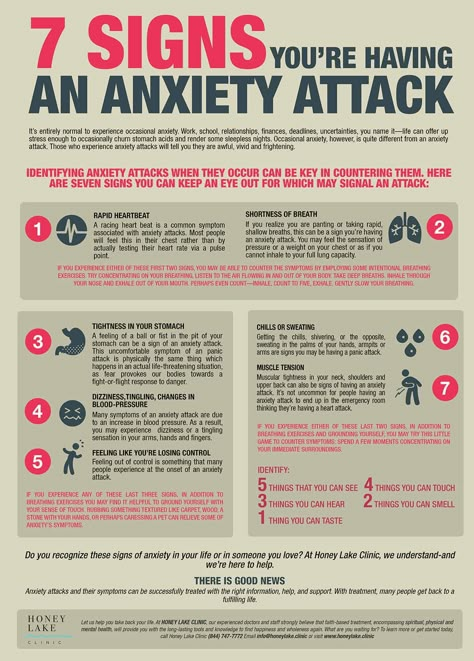 ) This does NOT mean that parents cause anxiety – they absolutely don’t. It’s likely that both genetics and environment play a part – the genetic vulnerability to anxiety makes it easier for environmental factors to stir anxiety. It’s important to remember that genes aren’t destiny. Anxiety can be managed. Just because it’s in your family denims doesn’t mean it will be passed to you, and if it is passed down, you won’t necessarily do anxiety in the same way as the people who came before you.
) This does NOT mean that parents cause anxiety – they absolutely don’t. It’s likely that both genetics and environment play a part – the genetic vulnerability to anxiety makes it easier for environmental factors to stir anxiety. It’s important to remember that genes aren’t destiny. Anxiety can be managed. Just because it’s in your family denims doesn’t mean it will be passed to you, and if it is passed down, you won’t necessarily do anxiety in the same way as the people who came before you. -
Anxiety can be physically painful.
Anxiety has a strong physical basis. Every physical symptom is a direct result of the body’s fight or flight response. When the brain senses a threat (real or imagined – it doesn’t care) it will surge the body with a cocktail of neurochemicals to provide the physical resources to fight for life or run for it. Physical symptoms can include a tightening around the chest, headaches, nausea, muscle tension, heart palpitations and tummy trouble.
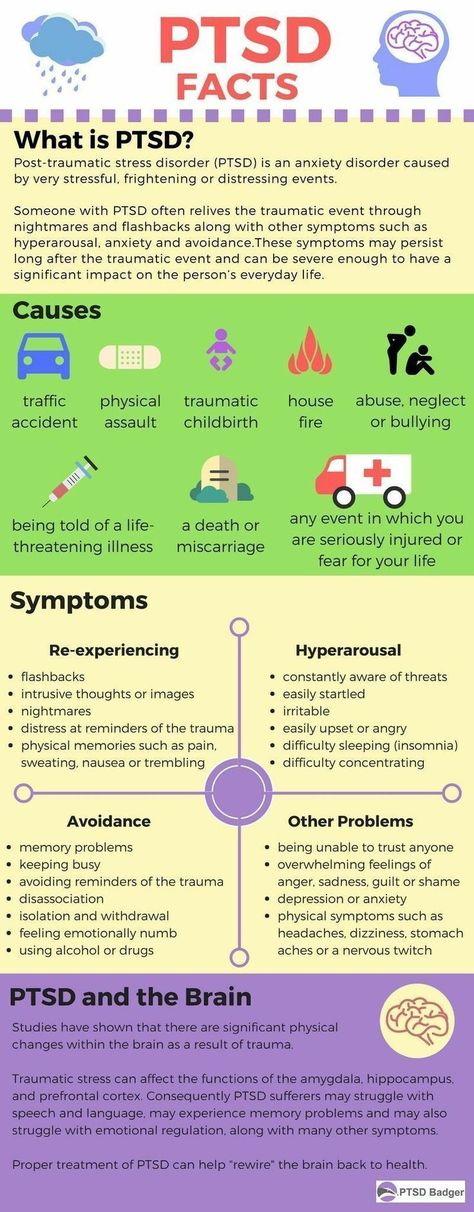 Anxiety hurts. It’s different for everyone but the physical response is just as real as the emotional one.
Anxiety hurts. It’s different for everyone but the physical response is just as real as the emotional one. -
Exercise can reduce anxiety.
Anxiety is the body’s fight or flight response in full swing. When there is nothing to fight and nothing to flee, the stress hormones that are surging around have nowhere to go so they build up, bringing with them the physical symptoms of anxiety. Physical activity is the natural end to the fight or flight response. Exercise helps to balance out the neurochemicals that contribute to anxiety.
-
Anxiety can confuse the sense of smell.
Research published in the Journal of Neuroscience found that people with anxiety have a greater tendency to label neutral smells as bad smells. Typically, when processing smells it’s only the olfactory (smelling) system that gets activated. When a person becomes anxious the emotional system becomes intertwined with the olfactory processing system.
-
People with anxiety are quicker to perceive changes in facial expressions.

People with anxiety are quicker to pick up on changes in facial expressions than those without anxiety BUT they are less accurate. The tendency to jump to conclusions means that highly anxious people will often make mistakes when trying to infer other people’s emotional states and intentions. Understandably, this has a way of creating tension and conflict in relationships. If you’re the anxious one, keep in mind that what you think others are thinking or feeling might not necessarily be right – your speedy powers of perception might have fed you a misread.
-
Certain diets can influence anxiety.
A study published in the American Journal of Psychiatry found that people who followed a ‘traditional’ diet consisting of vegetables, fruit, meat, fish and whole grains tended to be less anxious compared to those who followed a ‘western’ diet of processed or fried foods, refined grains, sugary products and beer.
-
Anxiety widens personal space.
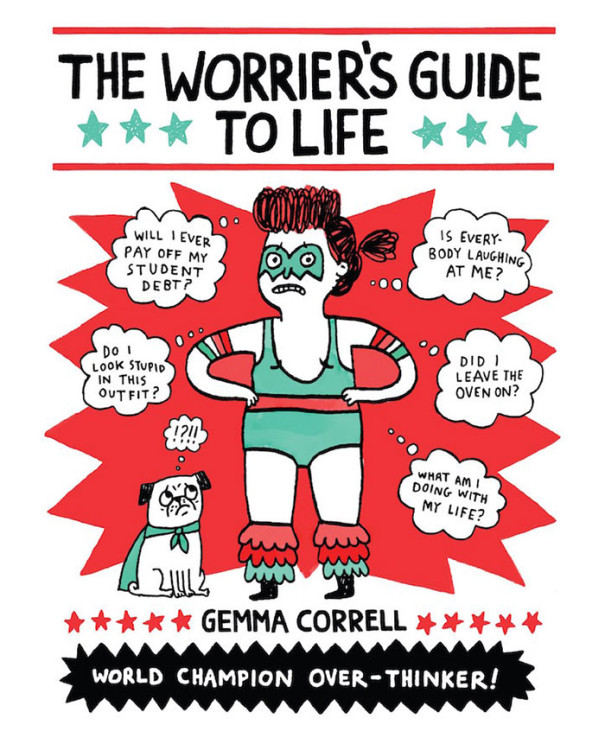
Everybody has an invisible zone of personal space around them. The closer we are to someone, the further they are allowed into our personal space zone. The preferred personal space zone differs for everyone but generally it’s about 20-40cm away from our face. Closer than that and we’re stepping back. If you tend towards anxiety, your personal space bubble is likely to be wider.
-
Performance anxiety? Nah. Excited.
Research by the Harvard Business School has shown that anxiety around performance is better managed by getting excited. The secret is in the re-labelling. The way we talk about our feelings has an enormous impact on the way we feel. Both anxiety and excitement have a lot of the same physical elements. Labelling a feeling as ‘anxious’ brings to mind thoughts of what might go wrong. Reinterpreting it as ‘excited’ brings on a more positive emotional state.
-
Your friends actually think you’re pretty fabulous.
People with social anxiety often think they don’t come across well socially.
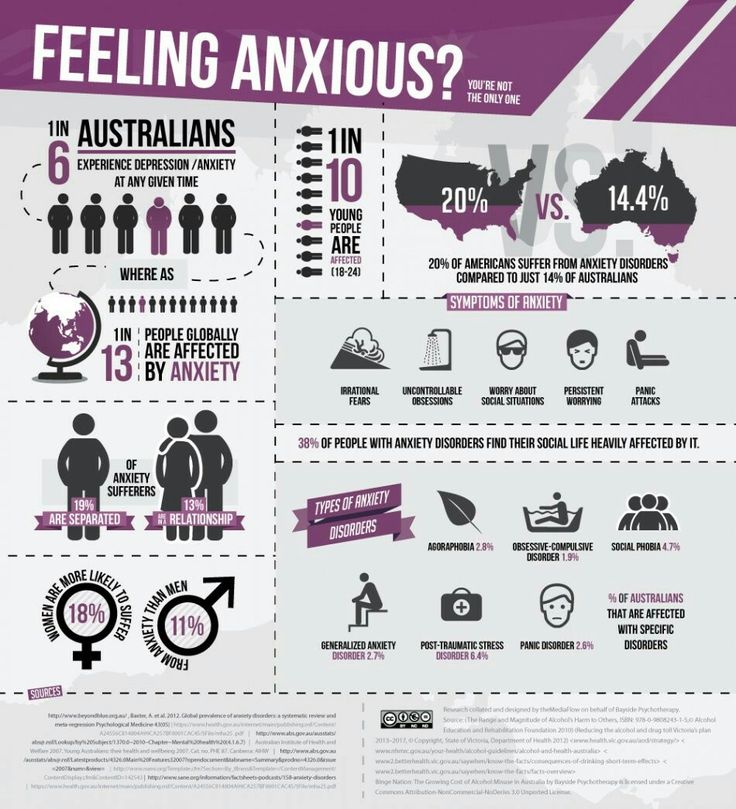 According to new research however, people think they’re pretty fabulous. Possibly due to their sensitivity to others, by the time socially anxious people speak, their words are well considered and ready to leave an impression – which they often do. If you struggle with social anxiety, remember that when you let people see you, they really like you. You might not believe this just because you’ve read it here, but next time you’re out, try acting as though it’s true. It will make a difference to you and to the way you’re seen.
According to new research however, people think they’re pretty fabulous. Possibly due to their sensitivity to others, by the time socially anxious people speak, their words are well considered and ready to leave an impression – which they often do. If you struggle with social anxiety, remember that when you let people see you, they really like you. You might not believe this just because you’ve read it here, but next time you’re out, try acting as though it’s true. It will make a difference to you and to the way you’re seen. -
Anxiety also comes with strengths.
Nothing about us is all good or all bad – nothing. If you’ve struggled with anxiety, for all the angst it causes you, it’s also helped to shape the person you’ve become in positive ways – the choices you make, the friend you are, the partner, colleague, sister, brother, leader or employee you are. Anxiety is not who you are, it’s something that happens to you sometimes. It’s part of being human and the sometimes beautiful, sometimes messy, sometimes extraordinary art that it is.

[irp posts=”106″ name=”Managing Anxiety: 8 Proven Ways”]
A Book for Kids About Anxiety …
‘Hey Warrior’ is the book I’ve written for children to help them understand anxiety and to find their ‘brave’. It explains why anxiety feels the way it does, and it will teach them how they can ‘be the boss of their brains’ during anxiety, to feel calm. It’s not always enough to tell kids what to do – they need to understand why it works. Hey Warrior does this, giving explanations in a fun, simple, way that helps things make sense in a, ‘Oh so that’s how that works!’ kind of way, alongside gorgeous illustrations.
7 Surprising Facts About Anxiety
Feelings of anxiety can arise in us both in connection with some unpleasant events, past, present and future, or without any reason. Not the most pleasant feeling, but nevertheless it has certain benefits for us - for example, it allows us to mobilize forces and come up with a solution to a problem that worries us. We have compiled a selection of little-known facts related to this feeling.
We have compiled a selection of little-known facts related to this feeling.
1. Anxiety causes bouts of nausea
Nausea is usually associated with fatigue. However, it can also provoke a sense of anxiety. The threat awakens a host of negative emotions, such as fear, anger, or disgust. Each of these emotions can be felt as a series of reflexes that affect the state of the whole organism. Comparing the effect on the brain and body of two such different emotions as disgust and fear, psychologists noted that their effect on the visual areas of the cerebral cortex is very similar. Experiencing a sense of anxiety, a person begins to distinguish a variety of bad smells much better. This leads to the fact that he begins to feel an oncoming attack of nausea. Apparently, this mechanism is laid down in us by evolution - the anxiety caused by food poisoning or an infectious disease is aimed at emptying the stomach, making it easier for the body to fight the poison or infection *.
* E.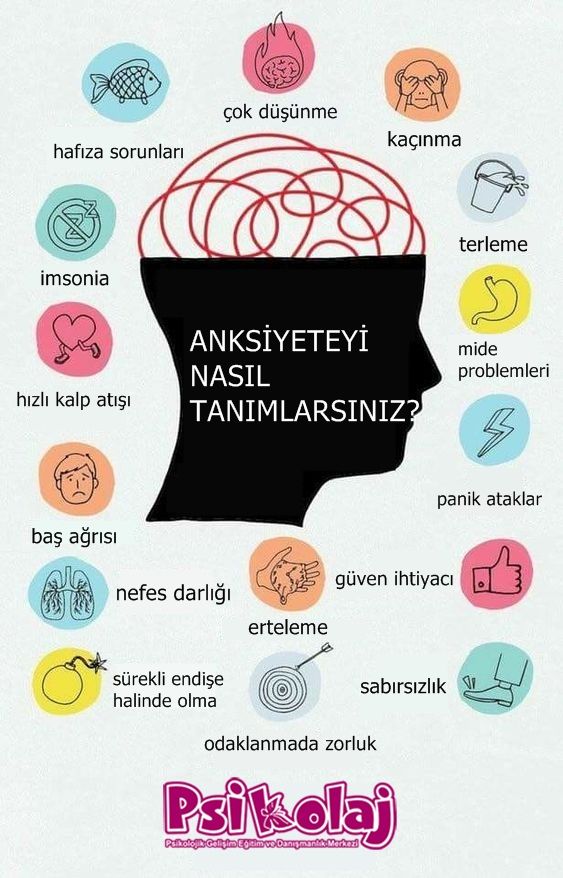 Krusemark, W. Li "From Early Sensory Specialization to Later Perceptual Generalization: Dynamic Temporal Progression in Perceiving Individual Threats" The Journal of Neuroscience, 2013.
Krusemark, W. Li "From Early Sensory Specialization to Later Perceptual Generalization: Dynamic Temporal Progression in Perceiving Individual Threats" The Journal of Neuroscience, 2013.
, the feeling of anxiety can be noticeably dulled by jogging or push-ups from the floor. It only takes about 20 minutes of normal charging to reduce the feeling of anxiety to almost zero. At the same time, however, physical exercises cannot relieve stress caused not by abstract anxiety, but by some real unpleasant events - from such severe ones as an injury to as seemingly insignificant as a conversation with an unpleasant person. In other words, if you had a fight with someone before screaming and crying and trying to smooth out the effect of the quarrel by going to the gym, you will not succeed. But if you do a set of physical exercises every day, in the future it will make it easier to cope with stressful circumstances *.
* J. Smith "Effects of emotional exposure on state anxiety after acute exercise".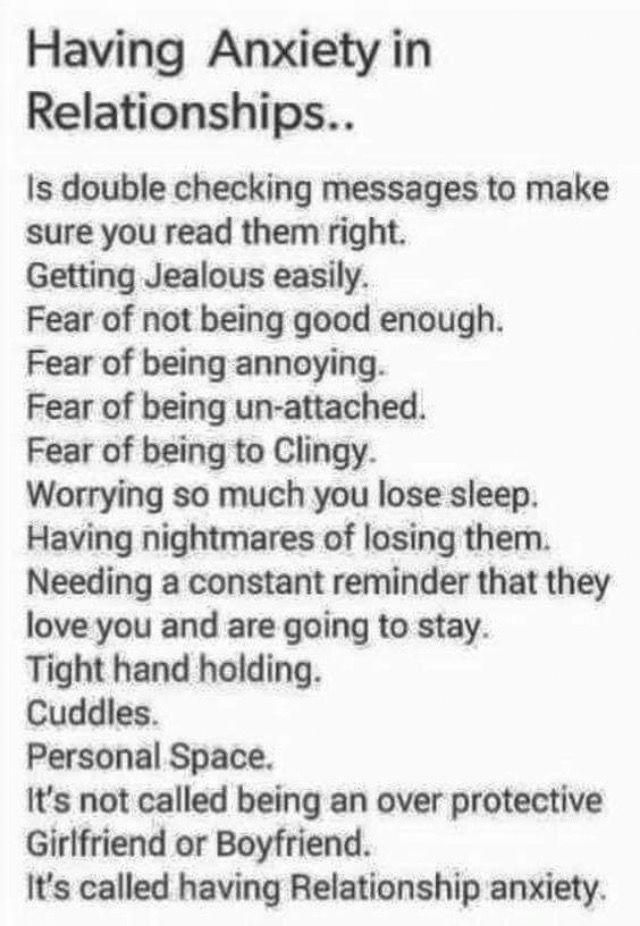 Medicine & Science in Sports & Exercise, 2013.
Medicine & Science in Sports & Exercise, 2013.
3. Parental habits of worrying
How often we feel anxiety, and how easily we are able to deal with it, may depend on our parents. And not only because a number of mechanisms associated with the occurrence of this sensation are embedded in our genes and provoke a different degree of expression of this emotion for each person. An equally significant role is played by the attitude of parents towards us in childhood or adolescence, when their assessments are the main ones for us. Parents who constantly criticize their children, find unpleasant traits in them and frighten them with a difficult life that they will have after achieving independence, instill in children a constant feeling of anxiety, which they will find it difficult to cope with in adulthood. On the contrary, parents who believe in their children and constantly emphasize that they are doing the right thing, significantly reduce the likelihood that they will often visit this unpleasant emotion *.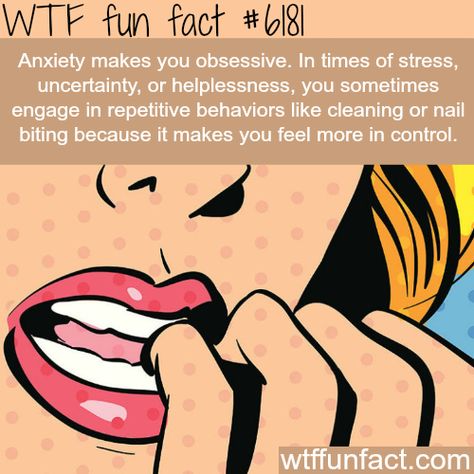
* M. Budinger, T. Drazdowski, G. Ginsburg "Anxiety-Promoting Parenting Behaviors: A Comparison of Anxious Parents with and without Social Anxiety Disorder." Child Psychiatry & Human Development, 2012.
4. Imagination can help you cope with anxiety
It doesn't take much imagination, just to think differently about upcoming events that are bothering you. For example, if you're taking an exam, just think of it as a fun quiz that you'd like to prove yourself on. If you're making an important presentation, imagine that you finally get to talk to your colleagues about a topic you've wanted to bring up for a long time. Consider the interview as an interesting acquaintance with new people and an excursion to a new company. A possible job loss is a chance to master a new field of activity for yourself. A curious feature of this way of dealing with anxiety is that it works almost instantly: the point is not to deviate from the intended line of attitude to the situation*.
* N. Llewellyn et al. "Reappraisal and suppression mediate the contribution of regulatory focus to anxiety in healthy adults". Emotion, 2013.
5. Anxious people draw superficial conclusions
Those who often feel anxious tend to jump to conclusions too quickly about the interlocutor's intentions or thoughts based on their facial expressions, tone of voice, movements, and so on. And this, according to psychologists, can be a serious source of relationship problems. Professor Chris Frehley, leader of the team of researchers who made this conclusion, explains: “The willingness to jump to conclusions based on a tiny detail is one of the reasons anxious people experience constant conflict in relationships. The irony is that, due to their sensitivity, they have the ability to draw more accurate conclusions than those who have a lower level of anxiety, but because they are too quick in their judgments of other people's moods, they constantly misjudge moods and intentions. others"*.
others"*.
* R. Fraley et al. "Adult Attachment and the Perception of Emotional Expressions: Probing the Hyperactivating Strategies Underlying Anxious Attachment". Journal of Personality, 2006.
6. Anxiety increases irritability
The constant feeling of anxiety quickly leads to disturbances in the normal change of mood - anxious people now and then break down on others, are more prone to tantrums, laughter inappropriately and tears for no reason. Often, this “worrying habit” is formed during childhood or adolescence. And since it is at this age that it is difficult to get to the real cause of drastic mood swings and related behaviors, psychotherapists often fail in their attempts to help a child or adolescent cope with these manifestations. However, this causal relationship also has the opposite effect: if the psychotherapist succeeds in harmonizing the patient's mood, this will also lead to a decrease in feelings of anxiety *.
* O. Barta et al. "Balance treatment ameliorates anxiety and increases self-esteem in children with comorbid anxiety and balance disorder". Research in Developmental Disabilities, 2009.
Research in Developmental Disabilities, 2009.
7. Anxious people need more personal space
Otherwise, he becomes a little uneasy. These boundaries, which, unfortunately, are easily violated in a crowded bus or subway car, are much wider for people who are often prone to anxiety - they can range from half a meter to a meter. They experience the violation of these boundaries much more acutely - it causes them both fear and a desire to immediately step aside, and undisguised aggression towards a person who has invaded invisible limits *.
* Ch. Sambo, G. Iannetti “Better Safe Than Sorry? The Safety Margin Surrounding the Body Is Increased by Anxiety". The Journal of Neuroscience, 2013.
Text: Ilya Nosyrev
New on the site
Sabbatical: how to go on vacation for six months
“I am a jester in society. Why don't they take me seriously?"
“I tried to leave my alcoholic husband twice, but returned each time”
“Screaming is the last argument”: 3 life examples of how to respond to manipulation
How to record an audio message or tiktok correctly
International Men's Day: what is important for men to know in order to maintain strength and health
Why everyone in the Teplyakov family is happy: the psychologist named 3 reasons
“I found out that my husband is texting a young girl.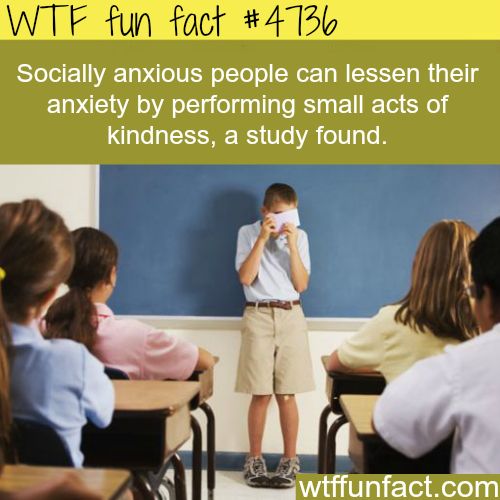 I don’t know what to do in such a situation”
I don’t know what to do in such a situation”
Interesting facts about feelings of anxiety / Science hit
Research shows that feelings of anxiety affect our sense of smell, our sense of balance, how we interpret other people's facial expressions, and even the size of the space we experience as "our own."
Feelings of anxiety can be very unpleasant and have extremely negative consequences, but they exist for a reason. Anxiety can tell us that we are in danger and something needs to be done urgently.
Our restless ancestors are to blame for everything, who always carefully prepared for the winter and thought about how to repel the attacks of neighboring tribes. They could not afford to remain calm and relaxed - it would not end well.
But the effect of anxiety is not limited to one motivation: it seeps through the mind into all possible areas ...
1. Anxiety literally fills everything around with a stench
As anxiety rises, people begin to perceive neutral odors as unpleasant. Thus, anxiety gives our world a bad smell.
Thus, anxiety gives our world a bad smell.
Professor Wen Li explained the reason: “In a typical odor processing process, only the olfactory system is involved. But as anxiety intensifies, our emotions are also connected to this process. ”
And the more a person is worried, the better he distinguishes unpleasant odors.
2. Physical exercise as a remedy for anxiety
As a rule, people, having exercised a little, worry about something a lot less. A 20-minute workout is enough to calm down. A little warm-up has a positive effect not only in the gym, but also in everyday life.
One study found that while rest can reduce anxiety, it does not help in stressful situations. Exercise, on the other hand, has a more lasting effect, helping to reduce anxiety in the most stressful situation. Moreover, many doctors believe that exercise is an excellent replacement for antidepressants.
3. Parental influence
Many people have a genetic predisposition to anxiety, but it also happens that the cause of anxiety is the behavior of parents. Children tend to get anxious when their parents criticize them, doubt their abilities, or are emotionally cold towards them.
Children tend to get anxious when their parents criticize them, doubt their abilities, or are emotionally cold towards them.
4. Think outside the box
One of the best ways to reduce anxiety is to look at the problem from a different angle.
“This is not an exam, but a small quiz. This is not a scary presentation, but just a conversation with colleagues. This is not an interview, but an opportunity to meet new people.”
Most situations can be rethought in this way. According to research, people who spontaneously do this experience less anxiety in a stressful situation than those who simply try to suppress their excitement.
5. Anxious people tend to jump to conclusions
Researcher Chris Frehley believes that anxiety can cause all sorts of relationship problems, as they tend to jump to conclusions about a person's condition based on their facial expressions alone.
Professor Frehley explained it this way: “Triggered sensory perception may be one of the reasons why people who are anxious are more likely to have conflicts. The irony is that the accuracy of their judgments is much higher than that of calm individuals, but the speed with which these judgments are made, as a rule, leads to an erroneous assessment of the state and intentions of other people.
6. Anxiety affects the sense of balance
People who suffer from a more severe degree of anxiety often experience balance problems. They often get dizzy and when they get up, they can stagger a little.
It most often begins in childhood, and since anxiety is difficult to treat in children, psychologists have begun to treat balance problems.
Dr. Orit Bart's research has shown that addressing balance issues can help manage anxiety.
7. Calming meditation
In addition to exercise and thinking outside the box, people who experience anxiety can try meditation.